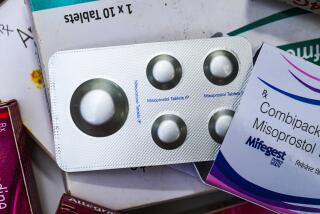Bush Vetoes Orphan-Drug Profit Curbs : Legislation: Some firms reap windfalls when federally subsidized medicines needed by very few people suddenly find wider applications.
- Share via
WASHINGTON — President Bush Friday vetoed legislation intended to prevent drug manufacturers from realizing unintended windfall profits from drugs developed under a law designed to stimulate research into therapies for rare disorders.
The legislation, approved unanimously by both houses of Congress, would have amended the 1983 Orphan Drug Act, which gives companies exclusive marketing rights and tax incentives to develop drugs for diseases that afflict fewer than 200,000 people.
In recent years, some manufacturers have reaped enormous profits from certain drugs, including a widely used AIDS therapy, that had received orphan drug status but later proved valuable for treating much larger groups of patients. Critics have charged that some firms have abused the provisions of the law by keeping the price of the drugs artificially high.
The amendments would have ended the special status when the number of people who need the drug exceeds 200,000. Also, the bill contained market-sharing provisions that would have applied if more than one company wanted to make the same drug within the same year.
In a statement, Bush said he had “serious concerns” that the amendments would have removed incentives for drug companies to develop new drugs.
“I believe we must not endanger the success of this program, which is due in large measure to the existence of the ‘market exclusivity’ provision in the Orphan Drug Act that allows companies to have exclusive marketing rights to an orphan drug for seven years,” Bush said.
“The certainty of this seven-year period is the basis of the economic incentive to attract drug firms to invest in orphan drugs,” the President said.
Bush said that he was aware of the intent of the amendments but remained “extremely concerned . . . that individuals with rare disease may suffer because of changes that this bill would make in the incentives to develop new drug treatments.”
The bill’s principal author, Rep. Henry A. Waxman (D-Los Angeles), said that Bush’s refusal to sign the legislation was a “shoddy” way for the Administration to handle the measure.
“The Orphan Drug Act was never envisioned to give a monopoly to a . . . manufacturer of a profitable drug so he could charge a higher price, which the consumer would have to pay or go without the drug,” Waxman said.
Waxman dismissed as “foolishness” the explanation offered by Bush for vetoing the legislation. “It sounds like he’s either unable to get beyond some ideological position or that some drug company that stands to gain has gotten his ear,” he said.
Abbey Meyers, executive director of the National Organization for Rare Disorders, said the veto was announced without warning.
“We’re devastated, just devastated,” she said. “We were told the President didn’t like it but would hold his nose and sign it. He’s got it all wrong. He doesn’t understand the legislation. The true orphan drugs are drugs of little commercial value. The incentives were a way to entice companies to make them. The bill was not written for the blockbusters. The amendments were designed to correct the abuses.”
The President’s decision was also criticized by Mary Ann Wilson, administrative director of Neurofibromatosis Inc., an organization representing individuals suffering from the rare disease, which is characterized by the growth of numerous tumors.
“These amendments (would have) helped to improve the act. It would have provided some competition among companies in order to keep the price down,” she said.
Under the original legislation, orphan drug designation has been applied to more than 300 therapies, of which nearly four dozen have reached the market.
However, there has been an unforeseen increase in the number of patients benefiting from several of these drugs, including aerosol pentamidine for the treatment of AIDS-related pneumocystis carinii pneumonia. The drug is made by Fujisawa USA of Rosemont, Ill.
Two other examples are erythropoietin, a drug made by Amgen Inc. and used to supply oxygen to the blood of kidney patients with anemia, and a human growth hormone, made by Genentech Inc. and Eli Lilly & Co., which share the rights to two slightly different versions.
Meyers vowed that an effort to resurrect the legislation would be made when the new Congress convenes in January. “We’re going to come back stronger than ever,” she said. “We have to come back and work very hard to get this thing through next year.”
More to Read
Inside the business of entertainment
The Wide Shot brings you news, analysis and insights on everything from streaming wars to production — and what it all means for the future.
You may occasionally receive promotional content from the Los Angeles Times.










